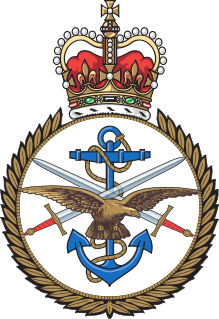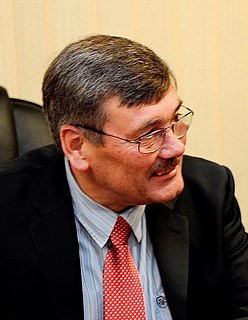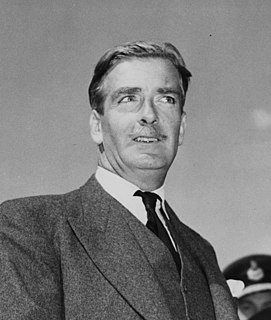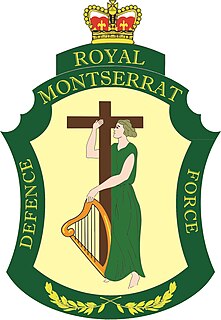
The British Armed Forces, also known as Her Majesty's Armed Forces, are the military services responsible for the defence of the United Kingdom, its overseas territories and the Crown dependencies. They also promote Britain's wider interests, support international peacekeeping efforts and provide humanitarian aid.

Robert William Ainsworth is a British Labour Party politician who was the Member of Parliament (MP) for Coventry North East from 1992 to 2015, and was the Secretary of State for Defence from 2009 to 2010. Following the general election in 2010 he was the Shadow Defence Secretary, but was replaced by Jim Murphy following the election of new Labour leader Ed Miliband.

RAF Daws Hill was a Ministry of Defence site, located near High Wycombe and Flackwell Heath, in Buckinghamshire, England, close to the M40 motorway.
A Ministry of Defence or Defense, also known as a Department of Defence or Defense, is the common name for a part of the government found in states where the government is divided into ministries or departments, responsible for matters of defence. Such a department usually includes all branches of the military, and is usually controlled by a Defence Minister, Minister of Defence, or Secretary of Defense.

The Royal College of Defence Studies (RCDS) instructs the most promising senior officers of the British Armed Forces, Her Majesty's Diplomatic Service and Civil Service in national defence and international security matters at the highest level, to prepare them for the top posts in their respective services. It forms part of the Defence Academy of the United Kingdom, and is its most senior and prestigious component. In addition, there are many overseas attendees these days, who are close allied to the United Kingdom government.

Home guard is a title given to various military organizations at various times, with the implication of an emergency or reserve force raised for local defense.

In the United Kingdom reserved matters and excepted matters are the areas of government policy where the UK Parliament had kept the exclusive power (jurisdiction) to make laws (legislate) in Scotland, Wales and Northern Ireland.

The Defence Science and Technology Laboratory (Dstl) is an executive agency of the Ministry of Defence of the United Kingdom. Its stated purpose is "to maximise the impact of science and technology for the defence and security of the UK." The agency is headed by Gary Aitkenhead as its Chief Executive, with the board being chaired by Sir David Pepper.. Ministerial responsibility lies with the Minister for Defence Procurement.
A military reserve force is a military organization composed of citizens of a country who combine a military role or career with a civilian career. They are not normally kept under arms and their main role is to be available to fight when their military requires additional manpower. Reserve forces are generally considered part of a permanent standing body of armed forces. The existence of reserve forces allows a nation to reduce its peacetime military expenditures while maintaining a force prepared for war. It is analogous to the historical model of military recruitment before the era of standing armies.

The Defence Medal is a campaign medal instituted by the United Kingdom in May 1945, to be awarded to subjects of the British Commonwealth for both non-operational military and certain types of civilian war service during the Second World War.
The Dreadnought class is the future replacement for the Vanguard class of ballistic missile submarines. Like their predecessors they will carry Trident II D-5 missiles. The Vanguard submarines entered service in the United Kingdom in the 1990s with an intended service life of 25 years. Their replacement is necessary if the Royal Navy is to maintain a continuous at-sea deterrent (CASD), the principle of operation behind the Trident system.

The Kingdom of Iceland was a constitutional monarchy, a sovereign and independent country that was established by the Act of Union with Denmark signed on 1 December 1918. It lasted until 17 June 1944 when a national referendum established the Republic of Iceland in its place.

The Territorial Force Imperial Service Badge was a short-lived decoration of the United Kingdom awarded to those members of the Territorial Force (TF) who were prepared to serve outside the United Kingdom in defence of the Empire, in the event of national emergency.
The conditions of enlistment for the TF laid down at their creation in 1908 did not allow for soldiers to be sent for service overseas against their will, as the TF was intended for home defence. However, any man could volunteer for the Imperial Service Section and serve abroad in times of war, which entitled him to wear this badge.

Following the resignation of Winston Churchill in April 1955, Anthony Eden, then-Foreign Secretary, took over as Leader of the Conservative Party, and thus became Prime Minister of the United Kingdom. Upon assuming office, Eden asked Queen Elizabeth II to dissolve parliament and called a general election for May 1955. After winning the general election with a majority of 60 seats in the House of Commons, Eden governed until his resignation on 10 January 1957.

Navy Command is the current headquarters body of the British Royal Navy, and its major organisational grouping. It is a hybrid, neither a command, nor simply an installation. Royal Navy official writings describe Navy Command Headquarters both as a physical site, on Whale Island, a collective formed of the most senior RN officers, and as a budgetary grouping.
The British Armed Forces recognises service and personal accomplishments of individuals while a member of the Royal Navy, British Army or Royal Air Force with the awarding of various awards and decorations.

The Royal Montserrat Defence Force is the home defence unit of the British Overseas Territory of Montserrat. Raised in 1899, the unit is today a reduced force of about forty volunteer soldiers, primarily concerned with civil Defence and ceremonial duties. The unit has a historical association with the Irish Guards. The current Commanding Officer is Major Alvin Ryan, who took over from the late Captain Horatio Tuitt. As a British Overseas Territory (BOT), defence of Montserrat remains the responsibility of the United Kingdom.
The Government of the United Kingdom maintains intelligence agencies within several different government departments. The agencies are responsible for collecting and producing foreign and domestic intelligence, providing military intelligence, performing espionage and counter-espionage. Their intelligence assessments contribute to the conduct of the foreign relations of the United Kingdom, maintaining the national security of the United Kingdom, military planning and law enforcement in the United Kingdom. The three main agencies are the Secret Intelligence Service (MI6), the Security Service (MI5), and the Government Communications Headquarters (GCHQ).












